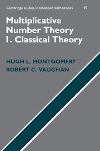- About MAA
- Membership
- MAA Publications
- Periodicals
- Blogs
- MAA Book Series
- MAA Press (an imprint of the AMS)
- MAA Notes
- MAA Reviews
- Mathematical Communication
- Information for Libraries
- Author Resources
- Advertise with MAA
- Meetings
- Competitions
- Programs
- Communities
- MAA Sections
- SIGMAA
- MAA Connect
- Students
- MAA Awards
- Awards Booklets
- Writing Awards
- Teaching Awards
- Service Awards
- Research Awards
- Lecture Awards
- Putnam Competition Individual and Team Winners
- D. E. Shaw Group AMC 8 Awards & Certificates
- Maryam Mirzakhani AMC 10 A Awards & Certificates
- Two Sigma AMC 10 B Awards & Certificates
- Jane Street AMC 12 A Awards & Certificates
- Akamai AMC 12 B Awards & Certificates
- High School Teachers
- News
You are here
Multiplicative Number Theory I: Classical Theory

Publisher:
Cambridge University Press
Publication Date:
2012
Number of Pages:
572
Format:
Paperback
Series:
Cambridge Studies in Advanced Mathematics
Price:
99.99
ISBN:
978-1107405820
Category:
Textbook
[Reviewed by , on ]
Allen Stenger
02/11/2024
This is an excellent introductory textbook in analytic number theory, aimed at graduate and upper-division undergraduate students. Multiplicative number theory means generally speaking the properties and distribution of the prime numbers, and of functions whose value depends on the prime numbers. Sometimes it is broadened to include all kinds of arithmetic functions (function defined on the positive integers), but the present book sticks fairly closely to the prime number theorem and distribution of the prime numbers. The subtitle “Classical Theory” is not explained, but it appears to mean results that were known before about 1930.
For the most part the theorems in this book are well-known and available in many other books. The attraction of this book is that (1) the exposition is especially clear; (2) the exercises are much better and more numerous than in other books; (3) the authors show the best proofs known today, even though the results are old.
Topics covered include: elementary theory of arithmetic functions (mostly estimating summatory functions), Dirichlet series, the prime number theorem, primes in arithmetic progressions, zeroes of the zeta function, closer study of error terms; and applications of all the preceding to number theory.
The exercises deserve our special attention. They are numerous (claimed to be over 500), wide-ranging, and at times perhaps overwhelming (for example, Section 2.1, introducing mean values of arithmetic functions, has four pages of text and seven pages of exercises). They are moderately difficult (probably “challenging” for the students this book is aimed at); some are
difficult, but these are broken down into numerous steps that are only moderately difficult. The exercises in many cases extend or continue discussions in the body, but they may be about any topic or technique that is even slightly related. These genuinely are “exercises” in the sense that they can be solved using the techniques just studied, with only a moderate amount of
ingenuity. No solutions are given for the exercises, but most include a reference to the literature where more information (but not necessarily a solution) can be found.
Very Good Feature: There are “pro tips” scattered through the work, showing the quick or easy way to perform various tasks. These are generally folklore, and most books don’t show them.
The work has remarkably few errors, especially considering the complexity of some of the formulas, and is the result of many years of teaching this material by the authors. Montgomery maintains a list of errata at his web site:
Two recent works that overlap this one somewhat are Ramaré’s Excursions in Multiplicative Number Theory and Koukoulopoulos’s The Distribution of Prime Numbers. Ramaré is a thoroughly modern work, that is not comprehensive, but that covers many modern techniques. Its special feature is that it concentrates on explicit constants in error terms. It also makes heavy use of computer calculations, specifically using PARI/GP and Sage. Koukoulopolous is a good survey, that covers some of the most recent results such as Zhang’s work on bounded gaps between primes (the twin prime conjecture). It is broader but shallower than the present work.
Davenport’s Multiplicative Number Theory (edited and revised by Montgomery) is also an excellent work and a good introduction to the field. It only covers a tiny portion of what the present work does, but explains it very well. It has no exercises.
Allen Stenger is a math hobbyist and retired software developer. He was Number Theory Editor of the Missouri Journal of Mathematical Sciences from 2010 through 2021. His personal web site is allenstenger.com. His mathematical interests are number theory and classical analysis.
Allen Stenger is a math hobbyist and retired software developer. He was Number Theory Editor of the Missouri Journal of Mathematical Sciences from 2010 through 2021. His personal web site is allenstenger.com. His mathematical interests are number theory and classical analysis.
See the publisher's website.
- Log in to post comments




